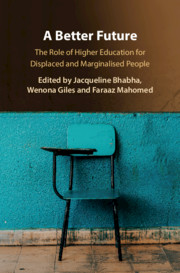Book contents
- A Better Future
- A Better Future
- Copyright page
- Contents
- Figures
- Tables
- Notes on Contributors
- Introduction
- Part I Encountering Marginalisation
- Part II Deconstructing Marginalisation
- Chapter 8 Providing Access to Higher Education for Refugees in Europe
- Chapter 9 The German Case
- Chapter 10 Colombian Distress Migrants in Ecuador
- Chapter 11 Transcending Socio-cultural Barriers
- Chapter 12 Combating the Exclusion and Marginalisation of Persons with Intellectual Disabilities in Higher Education in the United States
- Chapter 13 ‘Invisible’ Disabilities in South Africa’s Higher Education Sector
- Part III Confronting Marginalisation
- Index
- References
Chapter 8 - Providing Access to Higher Education for Refugees in Europe
An Opportunity to Rethink the University and Its Role in the Public Sphere
from Part II - Deconstructing Marginalisation
Published online by Cambridge University Press: 06 September 2020
- A Better Future
- A Better Future
- Copyright page
- Contents
- Figures
- Tables
- Notes on Contributors
- Introduction
- Part I Encountering Marginalisation
- Part II Deconstructing Marginalisation
- Chapter 8 Providing Access to Higher Education for Refugees in Europe
- Chapter 9 The German Case
- Chapter 10 Colombian Distress Migrants in Ecuador
- Chapter 11 Transcending Socio-cultural Barriers
- Chapter 12 Combating the Exclusion and Marginalisation of Persons with Intellectual Disabilities in Higher Education in the United States
- Chapter 13 ‘Invisible’ Disabilities in South Africa’s Higher Education Sector
- Part III Confronting Marginalisation
- Index
- References
Summary
Following the arrival of over a million ‘refugees and migrants’ to Europe in 2015, the EU and individual member states attempted to increase opportunities for migrants and refugees to access university. These measures aimed to address some of the difficulties that refugees faced in accessing higher education, but they stem from and reiterate a European ‘integration infrastructure’ that sees refugees as cultural others. ‘Refugees’ are reduced to a series of intervenable problems centred around the question of how they may be integrated into existing systems of work, education or ‘society’. This chapter explores two projects to incorporate refugees into higher education: the European Qualifications Passport (EQP) and Central European University’s Open Learning Initiative (OLIve) programme. The EQP is an ambitious attempt to codify the educational qualifications that refugees hold. OLIve runs programmes to assist people of refugee background to enter into higher education using funding received from the EU. Both projects question the integration framework, but both also encounter limitations. The chapter ends by arguing for policies based on Paolo Freire’s writings on how universities reproduce inequalities.
Keywords
- Type
- Chapter
- Information
- A Better FutureThe Role of Higher Education for Displaced and Marginalised People, pp. 177 - 196Publisher: Cambridge University PressPrint publication year: 2020

